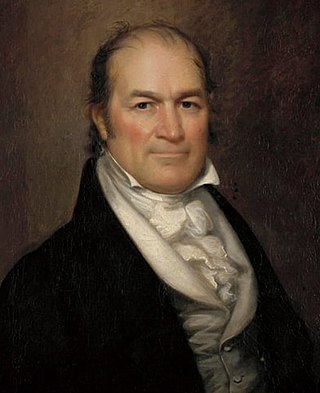
William Harris Crawford was an American politician and judge during the early 19th century. He served as US Secretary of War and US Secretary of the Treasury before he ran for US president in the 1824 election.

Austin Blair was a politician who served as the 13th governor of Michigan during the American Civil War and in Michigan's House of Representatives and Senate as well as the U.S. Senate. He was known as a strong opponent of slavery and secession. He also led efforts to provide women and black citizens the right to vote. He simultaneously sought to ban capital punishment.

The 1972 United States Senate elections were held on November 7, with the 33 seats of Class 2 contested in regular elections. They coincided with the landslide re-election of Republican President Richard Nixon. Despite Nixon's landslide victory, Democrats increased their majority by two seats. The Democrats picked up open seats in Kentucky and South Dakota, and defeated four incumbent senators: Gordon Allott of Colorado, J. Caleb Boggs of Delaware, Jack Miller of Iowa, and Margaret Chase Smith of Maine. The Republicans picked up open seats in New Mexico, North Carolina, and Oklahoma, and defeated one incumbent, William B. Spong Jr. of Virginia.

Texas's 7th congressional district of the United States House of Representatives comprises a small area of southwestern Houston and Harris County, along with a northern portion of suburban Fort Bend County. As of the 2000 census, the 7th district comprises 651,620 people. Since 2019, it has been represented by Democrat Lizzie Fletcher.

The 1964 United States Senate elections were held on November 3. The 33 seats of Class 1 were contested in regular elections. Special elections were also held to fill vacancies. They coincided with the election of President Lyndon B. Johnson by an overwhelming majority, to a full term. His Democratic Party picked up a net two seats from the Republicans. As of 2023, this was the last time either party has had a two-thirds majority in the Senate, which allowed the Senate Democrats to override a veto, propose constitutional amendments, or convict and expel certain officials without any votes from Senate Republicans. However, internal divisions would have prevented the Democrats from having done so. The Senate election cycle coincided with Democratic gains in the House in the same year.

The 1960 United States Senate elections coincided with the election of John F. Kennedy as president on November 8, 1960. The 33 seats of Class 2 were contested in regular elections. A special election was also held on June 28, 1960, for a mid-term vacancy in North Dakota where Democrats flipped a seat to expand their majority to 66–34. As Majority Leader Lyndon Johnson was elected Vice President, Mike Mansfield became the new majority leader.
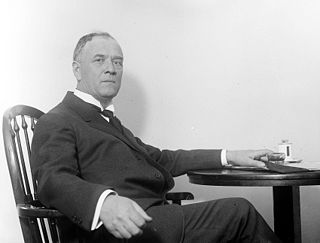
James Brooks Ayres Robertson, sometimes called J. B. A. Robertson, was an American lawyer, judge and the fourth governor of Oklahoma. Robertson was appointed by the state's first governor, Charles N. Haskell, to serve as a district judge.

Winston Lewis Prouty was an American politician. A member of the Republican Party, he served as a United States Senator from Vermont from 1959 until his death. He was previously a member of the United States House of Representatives, serving Vermont's At-large congressional district, from 1951 to 1959.
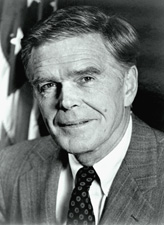
Floyd Kirk Haskell was an American lawyer and politician. A member of the Democratic Party, he served as a U.S. Senator from Colorado from 1973 to 1979.
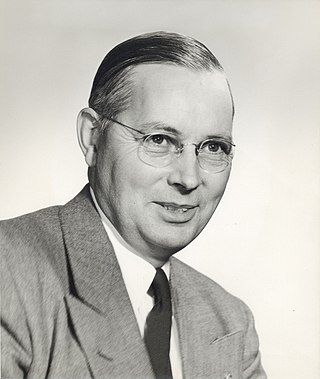
Burton Melvin Cross was an American Republican businessman and politician. Cross was Maine's 61st and 63rd Governor, though his two terms were separated by just 25 hours.

Harris Brown McDowell Jr. was an American farmer and politician from Middletown in New Castle County, Delaware. He was a member of the Democratic Party, who served in the Delaware General Assembly and five terms as U.S. Representative from Delaware.
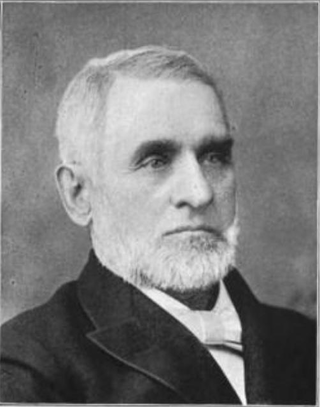
Cyrus Gray Luce was an American politician who served as the 21st governor of Michigan.

Timothy Lee Walberg is an American politician serving as a U.S. representative from Michigan since 2011, representing the state's 5th congressional district since 2023. A member of the Republican Party, he previously represented the 7th district from 2007 to 2009 and from 2011 to 2023. As the longest tenured member from Michigan, Walberg is the current Dean of its delegation to the U.S. House of Representatives.

Randall "Randy" Richardville is a Michigan Republican, who served as Majority Leader of the Michigan State Senate until his tenure ended January 1, 2015 due to term limits. He was state senator for the 17th district, which consists of all of Monroe, southern Washtenaw, and eastern Jackson counties, having taken office on January 1, 2007. He previously served in the Michigan House of Representatives for the 56th District from 1998 to 2004. This district covered the area of northeast Monroe County, Michigan.

Marvin Leonel Esch was an American politician from the U.S. state of Michigan and a member of the Republican Party. He served in the U.S. House of Representatives from 1967 to 1977 before unsuccessfully seeking a seat in the United States Senate in the 1976 election. Following his political career, Esch became active in business and political activism, becoming director of public affairs for the U.S. Steel Corporation and director of programs and seminars for the American Enterprise Institute.

William Seelye Linton was an American businessman and politician who served two terms in the U.S. House of Representatives from Michigan from 1893 to 1897.

Troy Dale Jackson is an American logger and politician from Allagash, Maine who served as president of the Maine Senate. Jackson represents Senate District 1, representing northern Aroostook County, including the towns of Fort Kent, Madawaska and Caribou. Jackson has served as Senate President from 2018 to 2024.

Luther Harvey Lodge was a Republican member of both houses of the Michigan Legislature between 1947 and 1974.
The Boston mayoral election of 1925 occurred on Tuesday, November 3, 1925. Malcolm Nichols, a former member of the Massachusetts House of Representatives and Massachusetts Senate, defeated nine other candidates to be elected mayor.

A general election was held in the U.S. state of Michigan on November 4, 2014. Primary elections were held on August 5, 2014.



















